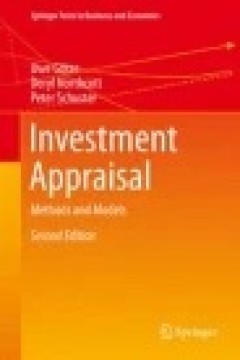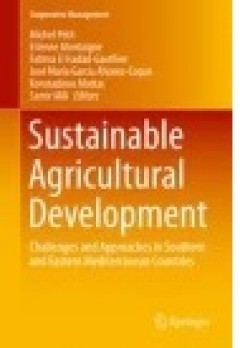Filter by

Trade Credit and Temporary Employment
This book presents an empirical investigation into the relationship between companies' short-term response to capital and labor market frictions and performance. Two different kinds of performance measures are considered, namely innovation performance and firm performance. The author focuses on two major topics: first, on the relation between innovation performance and the use of trade credit. …
- Edition
- 1
- ISBN/ISSN
- 978-3-319-29850-4
- Collation
- XIV, 102
- Series Title
- Contributions to Management Science
- Call Number
- -

Towards a General Theory of Deep Downturns
Joseph Stiglitz examines the theory behind the economic downturns that have plagued our world in recent times. This fascinating three-part lecture acknowledges the failure of economic models to successfully predict the 2008 crisis and explores alternative models which, if adopted, could potentially restore a stable and prosperous economy.
- Edition
- 1
- ISBN/ISSN
- 978-1-137-58691-9
- Collation
- VI, 71
- Series Title
- International Economic Association Series
- Call Number
- -

Towards a Dynamic Regional Innovation System
Embedding the theoretical discussion on the framework of evolutionary regional innovation systems (RIS), this book reveals the informal nature of the emerging RIS in China, within which interactive learning is organized on the basis of social networks. Furthermore, in a comparative study in the Pearl River Delta, China demonstrates that dirigiste governance in the initial industrialization phas…
- Edition
- 1
- ISBN/ISSN
- 978-3-662-45415-2
- Collation
- XI, 189
- Series Title
- -
- Call Number
- -

Investment Appraisal: Methods and Models
This book provides an introduction to investment appraisal and presents a range of methods and models, some of which are not widely known, or at least not well covered by other textbooks. Each approach is thoroughly described, evaluated and illustrated using examples, with its assumptions and limitations analyzed in terms of their implications for investment decision-making practice. Investment…
- Edition
- -
- ISBN/ISSN
- 978-3-662-45851-8
- Collation
- -
- Series Title
- -
- Call Number
- -

Sustainable Agricultural Development
This book provides an up-to-date assessment of sustainable agri-food systems and rural development in the Mediterranean countries. It examines and reviews the impact of EU and national policies on environmental and trade issues in agricultural and rural organizations in the southern and eastern Mediterranean region. The book also reflects key socio-economic and political issues such as resource…
- Edition
- -
- ISBN/ISSN
- 978-3-319-17813-4
- Collation
- XIX, 334
- Series Title
- Cooperative Management
- Call Number
- -

Investing into North African Solar Power: A Legal Framework for Risk Manageme…
This book investigates how a North African solar thermal power plant can be set up under the guidance of European investors (e.g. the Desertec Concept) as a Public Private Partnership (PPP). It outlines the importance of early awareness of contract-related risks, investment risks and dispute settlement, arguing that commercial and investment arbitration are the best tools for settling disputes …
- Edition
- -
- ISBN/ISSN
- 978-3-319-15756-6
- Collation
- -
- Series Title
- -
- Call Number
- -

A Theory of Sustainable Sociocultural and Economic Development
Why do some countries' economies struggle to develop, even when they are the focus of so much research and international funding? While recognizing that the obstacles facing poor nations are many and complex, Rabie proposes that the roots of most obstacles are sociocultural; thus, sociocultural transformation and economic restructuring can only be successful when treated as interconnected, mutu…
- Edition
- Ed. 1
- ISBN/ISSN
- 978-1-137-57952-2
- Collation
- XI, 243
- Series Title
- -
- Call Number
- 339 RAB t

Introduction to Insurance Mathematics: Technical and Financial Features of Ri…
This second edition expands the first chapters, which focus on the approach to risk management issues discussed in the first edition, to offer readers a better understanding of the risk management process and the relevant quantitative phases. In the following chapters the book examines life insurance, non-life insurance and pension plans, presenting the technical and financial aspects of risk t…
- Edition
- -
- ISBN/ISSN
- 978-3-319-21377-4
- Collation
- -
- Series Title
- -
- Call Number
- -

Modern Financial Crises
This book is devoted to the analysis of the three main financial crises that have marked this century: 2001 Argentina’s defaulting on its external debt, the American subprime crisis in 2008, and the current European debt crisis in Europe. The book pursues three major objectives: firstly, to accurately portray these three financial crises; secondly, to analyze what went wrong with mainstream e…
- Edition
- 1
- ISBN/ISSN
- 978-3-319-20990-6
- Collation
- XVII, 257
- Series Title
- Financial and Monetary Policy Studies
- Call Number
- -

Modern Corporate Finance, Investments and Taxation
This monograph is devoted to the modern theory of capital cost and capital structure and its application to the real economy. In particular, it presents a possible explanation to the causes of global financial crisis. The authors of the book modify the theory of Nobel Prize winners Modigliani and Miller to describe an alternative theory of capital cost and capital structure that can be applied …
- Edition
- 1
- ISBN/ISSN
- 978-3-319-38395-8
- Collation
- XVI, 368
- Series Title
- -
- Call Number
- -
 Computer Science, Information & General Works
Computer Science, Information & General Works  Philosophy & Psychology
Philosophy & Psychology  Religion
Religion  Social Sciences
Social Sciences  Language
Language  Pure Science
Pure Science  Applied Sciences
Applied Sciences  Art & Recreation
Art & Recreation  Literature
Literature  History & Geography
History & Geography